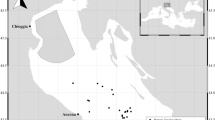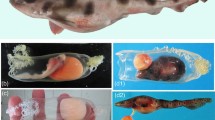Abstract
PART of the biological research of the Australian National Antarctic Research Expedition at Heard Island during 1951 was aimed at solving the unknown factors about the leopard seal, Hydrurga leoptonyx (De Blainville). The rate of fœtal growth for the complete gestation period was investigated and specimens were obtained from February onwards. No newly born pup had previously been seen, because the pregnant females migrate during September–October to the southern pack-ice where the pup is born. To overcome this difficulty, the men at Heard Island constructed a large mobile cage and drove a pregnant female leopard seal into it on September 12, 1951. Every three or four days the cage was dragged into the sea at low tide and left for the rest of the day. The seal would not feed during captivity, but it was noticed that she drank large quantities of sea water on being placed in the ocean.
This is a preview of subscription content, access via your institution
Access options
Subscribe to this journal
Receive 51 print issues and online access
$199.00 per year
only $3.90 per issue
Buy this article
- Purchase on Springer Link
- Instant access to full article PDF
Prices may be subject to local taxes which are calculated during checkout
Similar content being viewed by others
Author information
Authors and Affiliations
Rights and permissions
About this article
Cite this article
BROWN, K. Observations on the Newly Born Leopard Seal. Nature 170, 982–983 (1952). https://doi.org/10.1038/170982a0
Issue Date:
DOI: https://doi.org/10.1038/170982a0
This article is cited by
-
A review of leopard seal (Hydrurga leptonyx) births and pups using a standardised age-class classification system
Polar Biology (2022)
-
Seawater drinking restores water balance in dehydrated harp seals
Journal of Comparative Physiology B (2007)
Comments
By submitting a comment you agree to abide by our Terms and Community Guidelines. If you find something abusive or that does not comply with our terms or guidelines please flag it as inappropriate.



